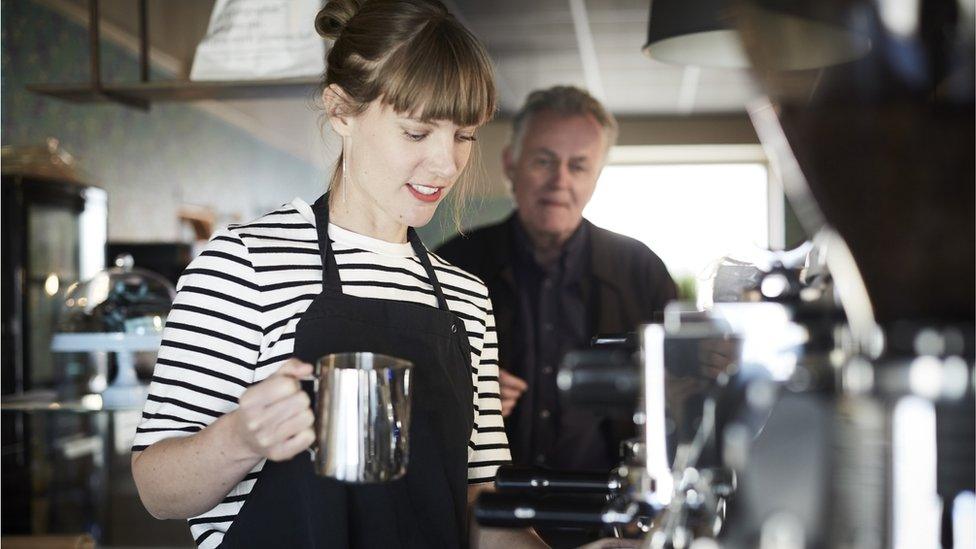National Insurance rise: Government must do more on cost of living - minister
- Published
- comments

The government needs to do "a lot more" to help people struggling with the cost of living, a minister has said, as some Tory MPs called for a rise in National Insurance to be delayed.
Defence Minister James Heappey said people were "feeling the squeeze" of rising prices and the government was in "listening mode".
But he said the tax hike, to fund health and social care, was right.
No 10 says the rise, which is due in April, will go ahead.
It comes after Prime Minister Boris Johnson said on Thursday: "We have to fund the Covid backlog, we have to fix social care."
But Conservative MP Robert Halfon, chair of the Commons Education Select Committee, said the funds should be raised through other means, telling the government to "go back to the drawing board".
And senior backbench MPs Robert Jenrick and Mel Stride called for the increase to be delayed, with Mr Jenrick saying 2022 would be "exceptionally hard" for families.
Under the plans, employees, employers and the self-employed will all pay 1.25p more in the pound for National Insurance (NI) from April 2022 for a year - after which the extra tax will be collected as a new Health and Social Care Levy.
The changes to National Insurance will see an employee on £20,000 a year pay an extra £89 in tax. Someone on £50,000 will pay £464 more.
From April, people earning under £9,880 a year, or £823 a month, won't have to pay National Insurance and won't have to pay the new levy.
Critics have said the increase will have a higher impact on the lower-paid and could contribute to inflation at a time when household budgets are under pressure.
And business leaders have warned that firms could offset the tax rise by raising prices.
'Much-needed money'
Asked on BBC One's Question Time whether the NI rise should be delayed, Mr Heappey acknowledged that "everybody at home is feeling the squeeze" in the face of rising food and energy bills, and the government would "need to do a lot" over the next few years to help people with this.
Mr Heappey said the top of government was in "listening mode at the moment", but he defended the planned rise, saying it would "raise money that is much needed".
Mr Halfon agreed that the funds were needed for the NHS and social care but called for the government to "look again" at other ways of raising the funds, including a windfall tax on firms that made big profits during the pandemic or by raising capital gains tax.
Capital gains tax is paid on profits made when someone sells, gives away or disposes of something they own, including shares that are not in an ISA.
Governments sometimes levy windfall taxes when companies have made large, unexpected profits - especially if they have benefited from economic conditions.
Mr Halfon told BBC Radio 4's Today programme a "cost of living package" was needed to reduce taxes for the lower paid, which he said could be funded through cuts the government has made to the foreign aid budget and with changes to the green levy.
Labour leader Sir Keir Starmer said the planned rise came at a time when inflation was at its highest level in 30 years.
Speaking to broadcasters on a visit to Glasgow, he added: "It was the wrong thing to do and we argued strongly it shouldn't have happened."
Defence minister James Heappey says the government is "in listening mode"
'National priority'
Mr Jenrick, the former housing secretary, told BBC Two's Newsnight that 2022 was going to be an "exceptionally hard year" for families and a delay in rising NI "looks increasingly like a sensible thing for the government to do".
Mr Stride, chair of the Treasury Select Committee, also told the programme he believed there was "wiggle room" in the public finances to allow for a delay in the increase due to lower than expected borrowing.
But when asked on Friday if the rise was happening "no ifs, no buts", the prime minister's official spokesman said "yeah".
He added: "I think the chancellor set out at the time when we announced this policy why it is the right and best way to raise this money."
Mike Padgham, chairman of the Independent Care Group, told BBC 5 Live he supported the idea of extra funding for social care from general taxation rather than from a rise in NI.
But he added: "What is clear is that we have had decades of promises to fund social care properly but it has never come. So I am very worried that if it is scrapped then we will never get the funding."
The government says the changes are expected to raise £12bn a year, which will go initially towards easing pressure on the NHS .
A proportion will then be moved into social care system over the next three years.
Meanwhile, the prime minister continues to wait for senior civil servant Sue Gray's report into parties held at Downing Street during the pandemic.
On Friday, the Metropolitan Police said it had asked Ms Gray to make "minimal reference" in her report to events the force is looking at for its investigation into Covid rule breaking.

'I CAN'T REMEMBER THE LAST TIME I DID SOME GOOD': Watch The Responder on BBC iPlayer
FROM THE STREETS TO THE SCRIPT: How real-life experiences became a thrilling drama

Related topics
- Published6 November 2022

